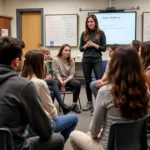Part 1: Introduction and Interview Questions
Common questions examiners ask about education and studying:
- Do you study or work?
- What subject are you studying?
- Why did you choose this subject?
- What do you find most challenging about your studies?
Sample answer (Band 8-9):
“I’m currently pursuing my master’s degree in Business Administration. I opted for this field because it aligns perfectly with my career aspirations in international business. The most challenging aspect is juggling multiple assignments while maintaining a good work-life balance. However, I find it tremendously rewarding when I can apply theoretical concepts to real-world business scenarios.”
Part 2: Long Turn (Cue Card)
Describe a time when you had to study hard for something.
You should say:
- What you were studying for
- How you prepared
- How long you studied
- And explain how you felt about the experience
Sample Answer (Band 8-9):
“I’d like to share my experience of preparing intensively for my final university dissertation. It was a comprehensive research project on sustainable business practices, which required meticulous preparation over six months.
I adopted a systematic approach by breaking down the work into manageable chunks. I would dedicate four hours every morning to research and writing, maintaining strict discipline in my schedule. I made it a point to visit the library regularly and consult with my professors for guidance.
What made this experience particularly memorable was how I learned to push my boundaries. Despite the challenging nature of the work, I remained focused and determined. The experience was incredibly fulfilling as it helped me develop not just academic knowledge but also essential life skills like time management and perseverance.”
 Student preparing for IELTS speaking test with study materials
Student preparing for IELTS speaking test with study materials
Part 3: Two-way Discussion
Q: How has education changed in your country over the past decade?
Sample Answer (Band 8-9):
“There have been substantial changes in our education system. The most notable transformation has been the shift towards digital learning, which was dramatically accelerated by the pandemic. Educational institutions have embraced innovative teaching methods, incorporating interactive online platforms and blended learning approaches.
Moreover, there’s been a significant emphasis on developing critical thinking skills rather than just memorization. This paradigm shift has revolutionized the way students learn and engage with educational content. However, it’s worth noting that this transition has also highlighted the digital divide in our society, prompting educators and policymakers to address these disparities.”
Key Vocabulary and Expressions for High Scores
- Academic Collocations:
- Pursue higher education
- Conduct research
- Implement strategies
- Acquire knowledge
- Advanced Linking Phrases:
- Having said that
- On the contrary
- To put it another way
- In light of this
Examiner’s Tips for Success
- Practice active listening to understand questions fully
- Develop ideas thoroughly with relevant examples
- Use natural transitions between points
- Maintain eye contact and confident body language
- Demonstrate range in vocabulary and grammar structures
- Avoid memorized answers – aim for natural, spontaneous responses
Remember, success in IELTS Speaking comes from regular practice and authentic language use rather than memorized responses.


